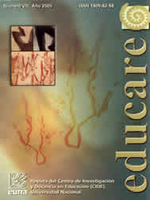Análisis de las prácticas evaluativas desde la perspectiva de los propios actores y actoras en la Región Atlántica
DOI:
https://doi.org/10.15359/ree.2005-8.3Abstract
The purpose of the investigation was to evaluate from a qualitive perspective the Scholastic Evaluation component in the project conducted in the Atlantic area of the country involved different participants of the educational community: regional teams, advisors, educators, parents, students. Diverse techniques were used to complete the information. The analysis departs from the logical experiences of the actors in the evaluative process. Problems and solutions were also identified by the participants.
Because of the characteristics of the study the voices of the participants are included. The texts are presented the way they were expressed by the actors.
References
Álvarez, J. M. (1995). "Valor social y académico de la evaluación". En Volver a Pensar en la Educación. Prácticas y Discursos Educativos. Vol. II (pp. 173-193)
Angulo, J. F. (1995). "La evaluación del sistema educativo: algunas propuestas críticas al porqué y al cómo". En Volver a Pensar en la Educación. Prácticas y Discursos Educativos. Vol. II (pp. 194-219) Madrid: Ediciones Morata.
Banco Interamericano de Desarrollo (1998). Evaluación del marco institucional del sistema educativo de Costa Rica: Informe Final. Washington D.C., agosto.
De Alba, A. (1991). Evaluación Curricular. Conformación conceptual del campo. México: Universidad Nacional Autónoma de México.
De Alba, A. (1996). Análisis de discurso educativo curricular. Una propuesta de evaluación curricular. Memoria. Foro-Taller sobre Tendencias Actuales en la Medición y Evaluación Educativa. Maestría en Evaluación Educativa: Universidad de Costa Rica.
Habermas (1999). Teoría de la acción comunicativa l. España: Taurus.
Ministerio de Educación ( 1996). bifomie Consolidado. Resultado de la Evaluación de medio período. Programa de Mejoramiento de la Calidad de la Educación. Costa Rica.
Ministerio de Educación (1994a). Política Educativa hacia el siglo XXI. Costa Rica.
Ministerio de Educación (1994b). Marco de Referencia para una Política Educativa Nacional. Síntesis de una concepción del proceso educativo para la orientación de la Evaluación. Despacho del Ministro de Educación. Costa Rica.
Ministerio de Educación (1986). Programa de Mejoramiento de la Calidad de la Educación. Costa Rica.
Ministerio de Educación (1998). PROMECE, Informe ele Avance.
Ministerio de Educación. "Anexo 3A", s.f. Costa Rica.
Ministerio de Educación (1991). Componente de Desarrollo Profesional. Proyecto MEP. BID. BIRF. Costa Rica.
Ministerio de Educación (1996). Convenio Formación de Docentes MEP, UCR, UNA, UNED, Plan de Acción, Antecedentes y Proyecciones.
Ministerio de Educación (1995). EL RETO DEL TERCER MILENIO: Una propuesta de un Proyecto Educativo Nacional Hacia el 2005 (EDU 2005). noviembre de 1995. Costa Rica.
Ministerio de Educación Pública (1999). Plan Estratégico para la Excelencia y la Equidad de la Educación, separata.
Picado, Marta (1997). Resumen Ejecutivo del Componente Evaluación, San José: Ministerio de Educación, noviembre.
Putnam, L. E. (2004). "La población afrocostarricense según los datos del censo de 2000". En: Rosero, L. (Ed.). Costa Rica a la luz del censo 2000. Costa Rica: Imprenta Nacional.
Santos, M. (1993). Hacer visible lo cotidiano. Teoría y práctica de la evaluación cualitativa de los centros escolares. Madrid: Akal Ediciones.
Published
How to Cite
Issue
Section
License
1. In case the submitted paper is accepted for publication, the author(s) FREELY, COSTLESS, EXCLUSIVELY AND FOR AN INDEFINITE TERM transfer copyrights and patrimonial rights to Universidad Nacional (UNA, Costa Rica). For more details check the Originality Statement and Copyright Transfer Agreement
2. REUTILIZATION RIGHTS: UNA authorizes authors to use, for any purpose (among them selfarchiving or autoarchiving) and to publish in the Internet in any electronic site, the paper´'s final version, both approved and published (post print), as long as it is done with a non commercial purpose, does not generate derivates without previous consentment and recognizes both publisher's name and authorship.
3. The submission and possible publication of the paper in the Educare Electronic Journal is ruled by the Journal’s editorial policies, the institutional rules of Universidad Nacional and the laws of the Republic of Costa Rica. Additionally, any possible difference of opinion or future dispute shall be settled in accordance with the mechanisms of Alternative Dispute Resolution and the Costa Rican Jurisdiction.
4. In all cases, it is understood that the opinions issued are those of the authors and do not necessarily reflect the position and opinion of Educare, CIDE or Universidad Nacional, Costa Rica. It is also understood that, in the exercise of academic freedom, the authors have carried out a rogorous scientific-academic process of research, reflection and argumentation thar lays within the thematic scope of interest of the Journal.
5. The papers published by Educare Electronic Journal use a Creative Commons License:














 The articles published by Educare Electronic Journal can be shared with a Creative Commons License:
The articles published by Educare Electronic Journal can be shared with a Creative Commons License: 



